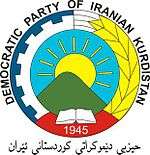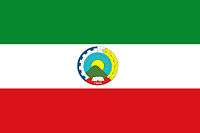Democratic Party of Iranian Kurdistan
Democratic Party of Iranian Kurdistan | |
|---|---|
 | |
| Leader | Mustafa Hijri |
| Founder | Qazi Muhammad |
| Founded | August 16, 1945 in Republic of Mahabad |
| Ideology |
Kurdish nationalism Secularism Social democracy Democratic socialism Social liberalism Progressivism Federalism |
| Political position | Centre-left |
| National affiliation | Congress of Nationalities for a Federal Iran |
| International affiliation |
Socialist International Progressive Alliance UNPO |
| Colors | white, yellow, light blue, dark blue, white, green and red |
| Party flag | |
 | |
| Website | |
|
pdki | |
The Democratic Party of Iranian Kurdistan (Kurdish: Partî Dêmokiratî Kurdistanî Êran, PDKI), also known as the Kurdish Democratic Party of Iran (KDPI), is a Kurdish political party in Iranian Kurdistan. The party aims for Kurdish national rights within a democratic federal republic of Iran.
History
Qazi Muhammad founded the PDKI in Mahabad, Iran, on 16 August 1945.[1] On 22 January 1946, Qazi Muhammad declared a Kurdish Republic of Mahabad, of which he formally became president. The Republic lasted less than a year: after the USSR retreated from the area, the Imperial Iranian army first reclaimed Iranian Azerbaijan, followed by Mahabad on 15 December 1946.[2] After the fall of the Republic, many of the PDKI leaders were arrested and executed, effectively ending the party.[3]
The PDKI cooperated with the Tudeh party and saw a short revival under the anti-Shah administration of Mohammad Mosaddegh (1951–53), but this ended after Shah Mohammad Reza Pahlavi took full control again in the 1953 Iranian coup d'état. In 1958, the PDKI was on the verge of unifying with the Iraqi Kurdistan Democratic Party (KDP), but was then dismantled by the SAVAK secret police. The remains of the PDKI continued to support the KDP, but this changed as the Shah started aiding the KDP, which fought against the Iraqi regime that had overthrown the royal Hashemite dynasty. In return for the Shah's aid, the KDP decerased its support for the PDKI.[4]
The PDKI reorganised itself, marginalising its pro-KDP leader Abd-Allah Ishaqi (also known as Ahmad Tawfiq), adding new communist and nationalist members, and forming the Revolutionary Committee to continue the struggle against the Iranian regime. The Committee began an unsuccessful revolution in March 1967, ending after 18 months.[1][3][4]
After reforms by a new leader, Abdul Rahman Ghassemlou, the PDKI fought alongside Islamic and Marxist movements against the Shah, culminating in the 1979 Iranian Revolution.[4] Khomeini's new Islamic regime, however, refused the Kurdish demands, suppressing the PDKI and other Kurdish parties. The PDKI continued its activities in exile, hoping to achieve "Kurdish national rights within a democratic federal republic of Iran".[3]
The highest PDKI organ is the Central Committee, composed of 21 permanent and 10 substitute members, elected in PDKI Congresses. The Central Committee elects 7 of its members for the executive Political Bureau, which also includes the Secretary-General. The current Secretary-General is Mustafa Hijri.
Mykonos restaurant assassinations
Sadeq Sharafkandi's murder became an international incident between Germany and Iran. On 17 September 1992, PDKI leaders Sadegh Sharafkandi, Fattah Abdoli, Homayoun Ardalan and their translator Nouri Dehkordi were assassinated at the Mykonos Greek restaurant in Berlin, Germany. In the Mykonos trial, the courts found Kazem Darabi, an Iranian national who worked as a grocer in Berlin, and Lebanese Abbas Rhayel, guilty of murder and sentenced them to life in prison. Two other Lebanese, Youssef Amin and Mohamed Atris, were convicted of being accessories to murder. In its 10 April 1997 ruling, the court issued an international arrest warrant for Iranian intelligence minister Hojjat al-Islam Ali Fallahian[5] after declaring that the assassination had been ordered by him with knowledge of Grand Ayatollah Ali Khamenei and President Ayatollah Rafsanjani.[6]
PDKI congresses
The PDKI has held fifteen congresses. These occurred in 1945, 1964, 1971, 1980, 1982, 1984, 1985, 1988, 1992, 1995, 1997, 2000, 2004, 2008, 2012.
During the 20th Congress of the Socialist International, held at the headquarters of the United Nations in New York City (9–11 September 1996), the PDKI was given the status of observer member. In 2005, the PDKI's membership was elevated to consultative status.
Secretaries-General
- Qazi Muhammad (1945–1947)
- (vacant) Ahmad Tofiq (1947–1973)
- Abdul Rahman Ghassemlou (1973–1989)
- Sadegh Sharafkandi (1989–1992)
- Mustafa Hijri (2004–)
See also
References
- 1 2 Ghassemlou, A.R. (1993). "Kurdistan in Iran". In Gérard Chaliand. A People Without a Country: The Kurds and Kurdistan. London: Zed Books. pp. 106–118. ISBN 978-1-85649-194-5.
- ↑ McDowall, David (2004). "Tribe or ethnicity? The Mahabad Republic". A Modern History of the Kurds: Third Edition. 3rd. I.B.Tauris. pp. 240–241. ISBN 978-1-85043-416-0.
- 1 2 3 Tamadonfar, Mehran (2015). "Civil Society in Iranian Political Life". Islamic Law and Governance in Contemporary Iran: Transcending Islam for Social, Economic, and Political Order. Lexington Books. p. 158. ISBN 978-1-4985-0757-8.
- 1 2 3 McDowall, David (2004). "Iran: Creating a national movement". A Modern History of the Kurds: Third Edition. 3rd. I.B.Tauris. pp. 249–254. ISBN 978-1-85043-416-0.
- ↑ Melman, Yossi (2008-04-02). "Israel fails to prevent Germany freeing Iranian". Haaretz.com. Retrieved 2012-02-10.
- ↑ Hakakian, Roya (4 October 2007). "The End of the Dispensable Iranian". Der Spiegel. Retrieved 31 January 2009.